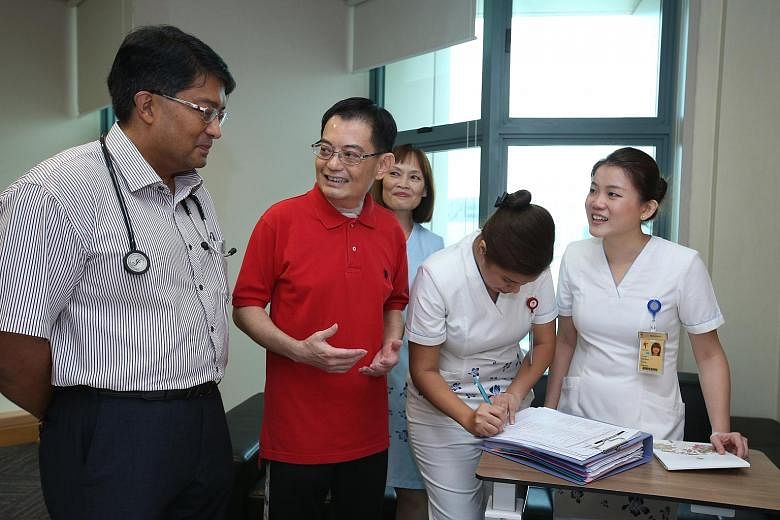The speed and nature of Finance Minister Heng Swee Keat's recovery from a stroke six weeks ago which required emergency surgery have surprised the medical community, with doctors paying tribute to the immediate attention he got and the care he received at Tan Tock Seng Hospital (TTSH).
It is a "spectacular recovery, given the bad shape he was in when admitted", said Dr Lee Kim En, a neurologist in private practice, after watching the video posted on Mr Heng's Facebook page showing him thanking TTSH staff. Mr Heng was discharged from hospital yesterday.
Around half of those who suffer bad bleeding in the brain would never leave hospital, Dr Lee said. Only about 10 to 15 per cent would recover well enough to return to a normal life. Fellow neurologist Ng Puay Yong agreed that the recovery was "very, very good", especially given the possible complications.
He believes that the help Mr Heng was given when he collapsed during a Cabinet meeting on May 12 was vital in his recovery, since four minutes without oxygen could mean permanent damage to the brain.
Dr Janil Puthucheary, Minister of State for Education and Communications and Information, who was present during the meeting, began resuscitation efforts while waiting for the ambulance. He is a paediatrician who became an MP in 2011.
Foreign Minister Vivian Balakrishnan, who was an eye surgeon before he entered politics, and Defence Minister Ng Eng Hen, a cancer surgeon by training, also tended to Mr Heng when he collapsed.
The team from the Singapore Civil Defence Force responded within seven minutes of the 995 call.
Dr Lee said other factors that helped Mr Heng recover were the "rapid diagnosis, decisive treatment to secure the rupture... and solid neurocritical care in the first weeks". A second bleeding would have been dire, he said.
It is likely that Mr Heng was put into an induced coma, to reduce brain activity and the need for oxygen. Dr Lee said in general, this could be anything from one to three weeks. During this time, his organs, such as the heart, lungs, liver and kidneys, needed artificial support to keep them oxygenated and healthy.
Dr Lee said Mr Heng was fortunate that the bleeding could be stopped with a coil, which requires minimally invasive treatment, rather than open surgery.
Both doctors noticed a plaster on Mr Heng's throat and believe he had a tracheostomy, or a cut in the windpipe, to keep his lungs ventilated. Dr Ng said this is usually done if the patient needs a tube down the throat for more than five days, to save the vocal cords. Damage to the cords could result in a hoarse voice. Once the tube is taken out, the hole will heal itself, but a scar might remain.
Mr Heng developed a lung infection in hospital, but Dr Ong Kian Chung, a respiratory specialist, said this is not surprising.
In patients who are unconscious for more than two hours, saliva may settle to the bottom of the lungs, causing pneumonia, which would be treated with antibiotics.
But this could leave scarring in the lungs. "The scars may or may not be permanent. A year from now, they may be smaller, or even have disappeared totally," Dr Ong explained.
Dr Lee said most patients will need three to six months to recover from a stroke. During this time, they would need physical, emotional and cognitive rehabilitation. He said Mr Heng would have lost muscle mass, and this needs to be recovered.
Dr Ng added it is difficult to assess how well the brain has recovered, but said cognitive ability can continue to improve over two to three years. Both neurologists said Mr Heng will need to go for six- monthly MRI scans to check for a possible second aneurysm. But Dr Ng said the risk is low, at about 1 per cent over 10 years.
All three doctors, who have clinics at Mount Elizabeth Medical Centre, were not involved in Mr Heng's treatment.


